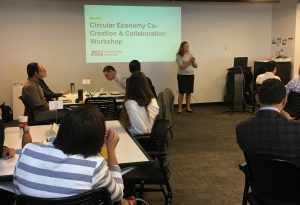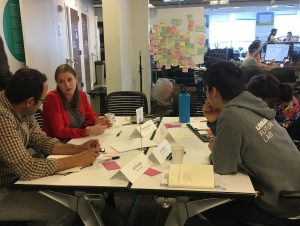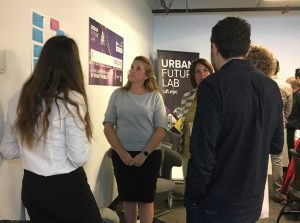 Earlier this May, the RISN Incubator team partnered with Urban Future Lab to host the first in a series of workshops focused on driving collaboration and co-creation among key stakeholders in the Circular Economy landscape. Held in New York City, the workshop brought together entrepreneurs and individuals including municipalities, higher education, capital groups, design firms, corporations and foundations with the objective of answering the question “how might we collectively accelerate the implementation of a circular economy?”.
Earlier this May, the RISN Incubator team partnered with Urban Future Lab to host the first in a series of workshops focused on driving collaboration and co-creation among key stakeholders in the Circular Economy landscape. Held in New York City, the workshop brought together entrepreneurs and individuals including municipalities, higher education, capital groups, design firms, corporations and foundations with the objective of answering the question “how might we collectively accelerate the implementation of a circular economy?”.
 The workshop began with an exploration of what the future of Circular Economy might look like and the pathways to collaboration needed for the transition from linear to circular to succeed. Participants, including representatives from Closed Loop Partners, IDEO, DOW Chemical Company, Seventh Generation, CISCO, City of Phoenix, City of Austin, New York University and RISN Incubator venture Circonomy Solutions, theorized on what the global economy might look like a decade from now and mapped out potential collaboration areas that could be established to support and accelerate that shift. With a consensus on a shared ideal future identified, the workshop segued into an open discussion about specific challenges and opportunities each stakeholder was experiencing relative to their personal and professional missions and goals while working toward achieving the identified ideal future. At the end of the discussion, the most common frustration expressed was related to industry silos and the need to break out and be collaborative rather than competitive to truly make an impact in this space.
The workshop began with an exploration of what the future of Circular Economy might look like and the pathways to collaboration needed for the transition from linear to circular to succeed. Participants, including representatives from Closed Loop Partners, IDEO, DOW Chemical Company, Seventh Generation, CISCO, City of Phoenix, City of Austin, New York University and RISN Incubator venture Circonomy Solutions, theorized on what the global economy might look like a decade from now and mapped out potential collaboration areas that could be established to support and accelerate that shift. With a consensus on a shared ideal future identified, the workshop segued into an open discussion about specific challenges and opportunities each stakeholder was experiencing relative to their personal and professional missions and goals while working toward achieving the identified ideal future. At the end of the discussion, the most common frustration expressed was related to industry silos and the need to break out and be collaborative rather than competitive to truly make an impact in this space.
 As the workshop shifted into the afternoon activities, key themes began to appear pertaining to the work being done in circular economy. Some of these themes included the role of automation, the rise of public-private partnerships, the expansion of the shared-economy, the mitigation of waste, and the roles socially minded corporations can and do play. Rather than identify priority areas for collaboration and co-creation based on these themes, participants moved forward with identifying potential solutions to the pain points being experienced. As the day winded down, the event concluded with a second open discussion on how to prioritize the solutions everyone was hoping to achieve and what the next steps for collaboration and action could be.
As the workshop shifted into the afternoon activities, key themes began to appear pertaining to the work being done in circular economy. Some of these themes included the role of automation, the rise of public-private partnerships, the expansion of the shared-economy, the mitigation of waste, and the roles socially minded corporations can and do play. Rather than identify priority areas for collaboration and co-creation based on these themes, participants moved forward with identifying potential solutions to the pain points being experienced. As the day winded down, the event concluded with a second open discussion on how to prioritize the solutions everyone was hoping to achieve and what the next steps for collaboration and action could be.
After the success of this first workshop, the RISN Incubator team started partnering with other organizations to develop and continue the Circular Economy Co-Creation and Collaboration series and continue the work towards accelerating the circular economy. More details to come as they unfold.


